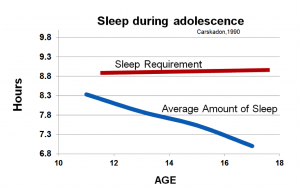The National Sleep Foundations (NSF) recommends that adolescents and young adults receive 8-10 hours of sleep per night.
However, the average amount of sleep obtained decreases in the high school years as the teenagers’ biological clock causes them to fall asleep later, yet schools start early.
Less than 13% of high school students in the US obtain 8 hours of sleep or more. (2006 NSF poll)

Research conducted by Kyla Wahlstrom, Ph.D. at the University of Minnesota has clearly revealed that school start times beginning no earlier than 8:30 a.m. for grades 9 through 12 improve outcomes in three important areas:
- decreased depression and fewer poor choices about substance abuse
- decreased car crashes in some cases by as much as 70%
- improved academic performance on state and national achievement test
The School Start Time Committee is comprised of sleep medicine experts who understand the benefits of a later school start time as well as the unfortunate and avoidable negative consequences of an early start times for teenagers.
School Start Time Committee Members
Keith Cavanaugh, MD
Julie Dahl, APRN,CNP
John Garcia, MD
Con Iber, MD
Wendy Meyers, APRN,CNP
Jonathan Parker, DDS
Kyla Wahlstrom, PhD
